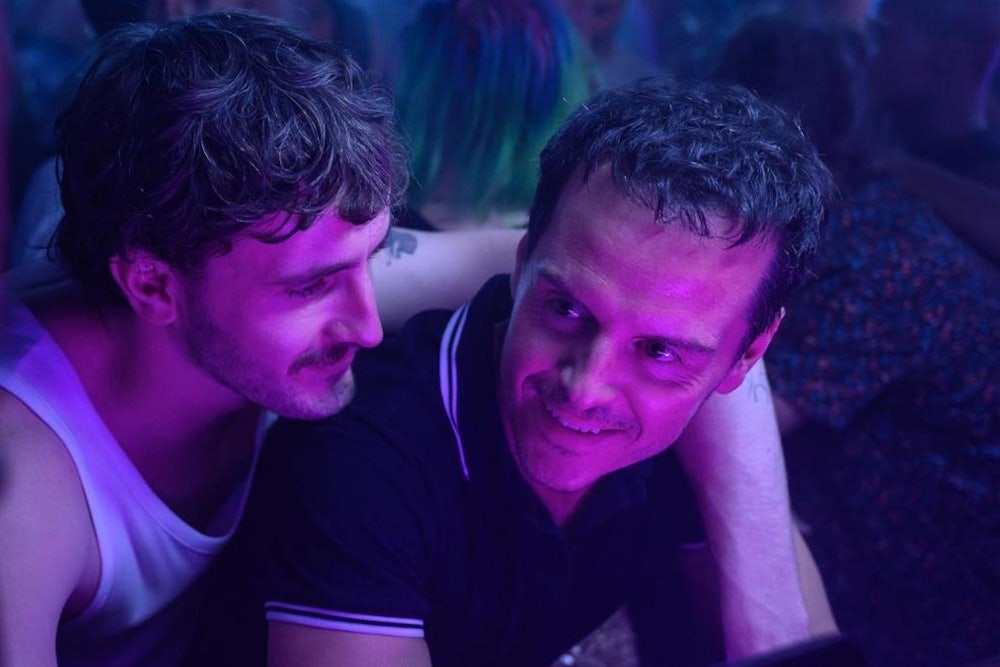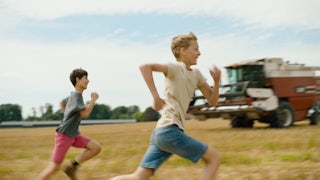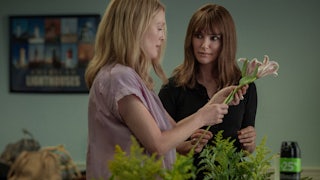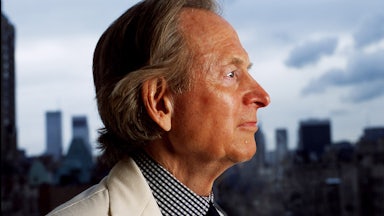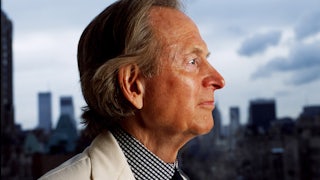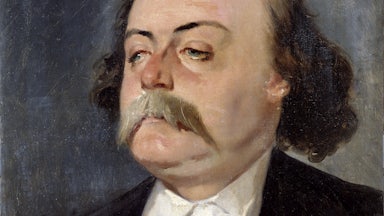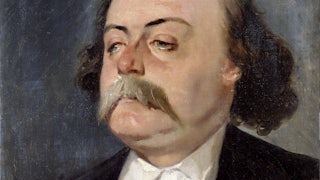The common denominator of the best ghost stories, from the canon to the campfire, is closure. Or a lack thereof; as Salman Rushdie asked in The Satanic Verses, what is a spirit but unfinished business? The voices that whisper in the night, whether they’re in the walls or in our heads, are trying to tell us something, even—and sometimes especially—if it’s too late.
Andrew Haigh’s eerie and evocative new drama, All of Us Strangers, is pressurized by problems of communication: It’s a film in which the living and dead alike are haunted by the specter of things left unsaid. The screenplay is adapted from the 1987 novel Strangers, by the late Japanese writer Taichi Yamada, about a middle-aged man who is suddenly gifted—or is it cursed?—with an opportunity to commune with his long-deceased and still-young parents. No explanation is given for the main character’s new abilities, and the question of whether he’s ultimately hallucinating his encounters is left open. But regardless of the reality of the situation, the meetings have consequences; as the book goes on, it’s as if these loving, attentive apparitions are slowly sucking away his life force.
Despite its supernatural trappings, Strangers is not really a horror novel, and Haigh is certainly not a genre filmmaker. He’s more of a portraitist, one whose ardent, probing close-ups scrutinize the uneasiness of his characters’ inner lives. His best work is emotionally translucent and attentive to sexual politics; 2011’s Weekend, about a fateful two-night stand, and the acclaimed HBO series Looking (set in contemporary San Francisco and centered on a trio of gay friends) are both considered keynotes of millennial queer representation.
Besides shifting Yamada’s narrative from Tokyo to the outskirts of London, Haigh remaps the story’s psychological terrain. His protagonist, Adam (Andrew Scott), is a gay screenwriter struggling with creative block. He’s seemingly resigned to a weary, watchful middle age on the suburban margins, until he’s suddenly drawn to his apartment-block neighbor, Harry (Paul Mescal). An early shot of Adam gazing up at Harry’s illuminated window somehow suggests both separation and connection; they’re like two points on a lonely modern continuum. As carefully framed by Haigh, they could also be the only two people in the entire world.
“I’ve seen you coming and going a bunch of times with your head down,” teases Harry during a wee-hours fire-alarm meet-cute. The question of whether Adam will continue keeping his head down—or else look up and Let the Right One In—provides All of Us Strangers with its basic narrative hook; the scenes of their subsequent, tentative relationship, which eventually spills out of their building and into the city’s nightlife (including the requisite, strobe-lit club scene) are interspersed with Adam’s intermittent seances. In less deft hands, the result might be the uneasy feeling of two movies competing for our attention. As deftly spliced together by Haigh and his editor, Jonathan Alberts, the halves don’t so much connect as superimpose, each over the other. The two very different narratives, with their complex layering of past and present, suggest that Haigh’s film is chasing the elusive, multileveled elasticity of love itself.
Even though Harry is considerably younger than Adam, he’s got the relaxed, easy manner of a practiced seducer; inviting himself in for a drink, whiskey bottle in hand, he’s wonderfully suave, even when initially he finds himself rebuffed. “We don’t have to do anything if I’m not your type,” he adds sweetly. “There’s vampires at my door.”
For a certain tuned-in constituency, this not-so-cryptic quotation of an early Frankie Goes to Hollywood hit could be a skeleton key unlocking the film’s pop-cultural subconscious. The film’s array of swoony, Thatcher-era U.K. pop anthems connects to Adam’s adolescence and the ecstatic defiance embedded in the music; it’s a sly joke that the twentysomething Harry uses an I-Love-the-’80s reference to soften up a man two decades his senior.
Working at a confident, unhurried pace, Haigh keeps a certain amount of suspense bound up in whether Adam is planning to tell his new partner about his visits or let his parents meet his “special friend.” Still, the relationship between the narrative’s two halves is less cause and effect than contextual. Adam’s hooded ambivalence isn’t a pose; he comes by his privacy honestly and painfully. He was 12 years old when his parents died, and never shared anything with them about his burgeoning sexual confusion or curiosity. “You were just a boy, and now you’re not,” says Adam’s mother (Claire Foy), an innocent remark that taps into her confusion at being reanimated, and neatly delineates the mystery—and terror—underpinning this particular family reunion.
It’s clear from their first (re) appearance that Mum and Dad (Jamie Bell) are decent, loving folks; the actors exude a modest, beguiling kindness. But they’re also frozen in time—bewildered not only by their liminal status but by the social changes they didn’t live to see. Plunged into a sort of metaphysical limbo localized in the space of his former suburban home—a familiar space made at once more welcoming and surreal by its seemingly tactile kitchen-sink reality—Adam is forced to get existential. His parents are all ears, but what does it mean to confess—or to come out—to someone who’s long since gone?
It’s mostly a matter of trivia to note that the homecoming scenes were shot precisely where Haigh grew up in Croydon; one might even chalk the choice up to the practicalities of low-budget filmmaking. But in a movie that hovers over the uncanny valley between past and present, a sense of place is everything, and the locations in All of Us Strangers suggest how thoroughly the director has personalized this project. The film’s world feels lived in and accessible, and so do the characters; it’s less that Adam is a stand-in for the director—or an emblem of contemporary queer identity—than that he’s a surrogate for the daunting process of channeling experience into art. Throughout the film, we get glimpses of a blank Word document on Adam’s lap—a small but forbidding canvas he’s hesitant to fill in; one way to read the film and its various ambiguities is as a visualization of his latest screenplay.
Scott, whose stage credits outstrip his screen ones (Fleabag’s hot priest notwithstanding) is an actor who generates his effects from the inside out, and he illuminates his character’s mix of reticence and need through subtle, precise externalization. When Adam speaks, it’s with a careful deliberation that lags behind the unconscious, transparent movements of his hands and eyes, which offer their own passionate disclosures. As for Mescal, who justly scored an Oscar nomination last year as a psychologically frail father in Aftersun, he’s got a fleshy charisma that betrays his emerging status as a social media pin-up, but his part and performance are trickier than they look. Harry’s need for intimacy is palpable—and irresistible—but it’s also got an air of grasping loneliness; his backstory is punctuated by a question mark.
When Weekend was released, Haigh was praised for depicting contemporary gay courtship rituals without preciousness or cliché; in one memorable scene, the characters played by Chris New and Tom Collen conduct a tape-recorded, postcoital interview, which yields startlingly vivid reflections on a hookup that has been deliberately left unseen. The love scenes in Weekend leveraged explicitness against a sort of gentle naturalism; on the whole, Haigh seemed beguiled—and excited—by the sense of possibility facing his characters as they edged toward adulthood. Here, the tenderness lingers, but it also aches—like brushing against a bruise. For Adam, who’s never quite been comfortable in his own skin—and who came of age in the era of AIDS—sex is a dual locus of catharsis and anxiety, and there is perhaps another version of this story in which Harry helps his older partner develop a freer and more relaxed relationship to his sexuality and the community of desire attached to it. But Haigh is after something more elusive and melancholy than happily ever after, and his pursuit takes the material to some dark places.
Visually, All of Us Strangers is sophisticated without being fussy; Haigh and his fine cinematographer, Jamie D. Ramsay, place Adam in a world of reflective surfaces that heightens the feeling of subjectivity. There are also a number of subtly but beautifully designed camera movements, including a sequence where Adam finds himself climbing into his parents’ bed—an image of regression suffused with paradoxical sensations of comfort and loss. It’s an image that Haigh will return to during the film’s coda, which occurs in the aftermath of a twist whose conceptual boldness may strike some as being at odds with the movie around it, but upon reflection seems essential to the filmmaker’s project and also fully encoded into the movie’s symbolic syntax.
The final tableaux, synced perfectly and purposefully to a classic Brit-pop anthem (one deployed without the ironic distance of David Fincher’s Smiths hit parade in The Killer) is a stunner; it blurs the line between literal and figurative reality while distilling show-stopping romanticism and emotional truth into something pure and intoxicating. “This time we go sublime, lovers entwine, divine divine,” sings the voice on the soundtrack; the highest compliment one can pay to Haigh’s film is that it lives up to its own final needle-drop.
